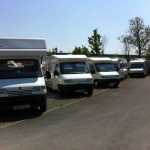Driving a motorhome during poor weather conditions can be challenging, dangerous and costly if an accident occurs and damage is sustained. It is strongly advised that unless completely unavoidable, you should opt out of driving a motorhome in challenging weather conditions.
If you must drive your motorhome during extreme weather conditions, there are a few crucial things you can do which can help minimise the risk of harm to yourself and others, and reduce damage to your vehicle if an accident occurs.

General advice during any adverse weather which must always be followed includes:
- checking the forecast and rescheduling your journey if possible
- slowing your speed to accommodate the conditions
- ensuring all lights are clean and switched on to increase visibility
- being prepared to pull off the road and wait if conditions deteriorate further
- carrying equipment that will assist you in an emergency situation
- ensuring mechanical maintenance is up to date and that wiper blades and screen wash levels are sufficient
Top tips for motorhome driving on ice or snow include:
- slowing down
- checking tyre pressure is optimal and that tread is sufficient to cope with cold conditions – you may choose to invest in winter tyres or snow chains if you regularly move your motorhome during winter
- ensuring your breakdown and accident recovery policy is up to date and covers your motorhome sufficiently in the case of breakdown or accident
- making sure your battery is charged
Top tips for motorhome driving through high winds include:
- driving slowly and steadily while avoiding weaving through traffic
- being very alert to the increased windage of your vehicle due to it’s large surface area, particularly if also towing a trailer
- remaining open to the possibility that, if the wind increases beyond a safe level, pausing the journey to sit out the worst of the wind is sensible – it is best to park
- wind and with shelter from other vehicles or structures
Top tips for motorhome driving during exceptionally wet weather include:
- slowing down to accommodate additional surface spray from other vehicles
- increasing the braking distance that you would normally leave
- applying caution when approaching standing water as it is often impossible to gauge the depth, which can lead to mechanical flooding and breakdown, or an uncontrolled hydroplane
Top tips for motorhome driving during misty and foggy weather include:
- ensuring all lights, including fog lights when visibility is severely compromised, are used correctly
- reducing speed significantly and, where appropriate, pulling off the road to allow following traffic to go ahead
- avoiding the use of hazard lights as these can confuse other traffic in reduced visibility, and may suggest you are indicating and about to make a turn
Although these tips are designed to assist you during adverse weather conditions, we would remind you that NOT driving your motorhome until better conditions prevail is always the best option!
As one of the leading providers of motorhomes, RVs and campervans throughout Nottingham, here at Glenns Motorhomes we also provide thorough and reliable motorhome servicing and repairs to ensure your vehicle is completely safe to drive. We also have a huge variety of motorhomes for you to choose from, so no matter what your requirements are we have a model suitable for you. Simply contact our friendly team today for further information.






